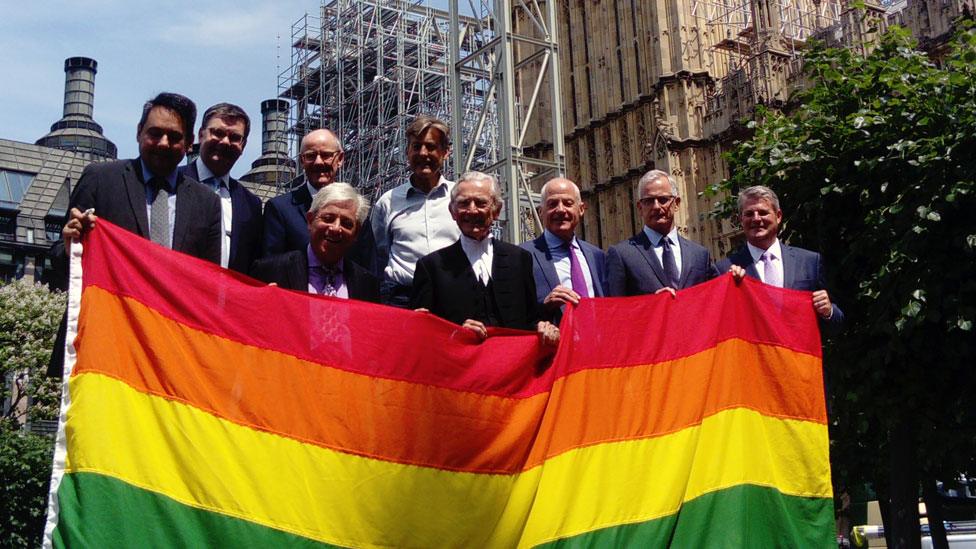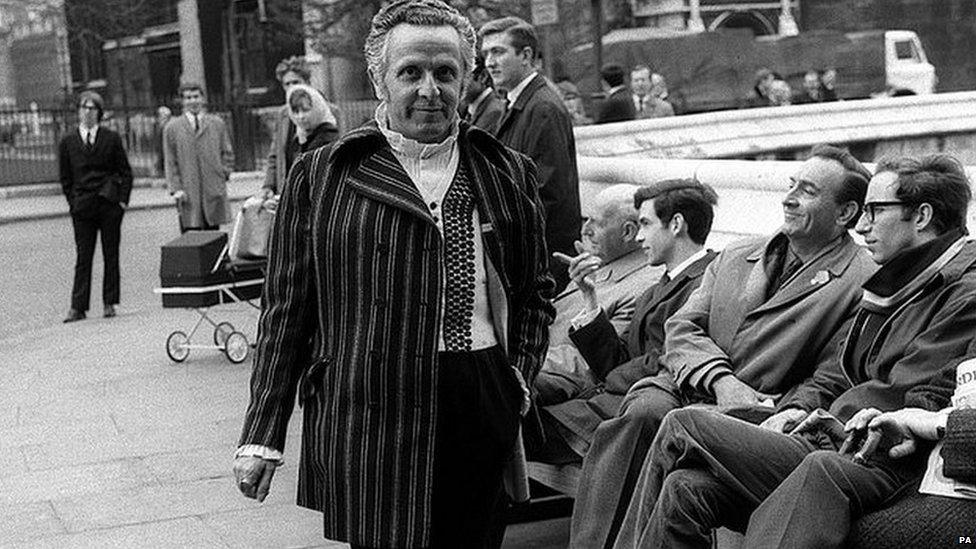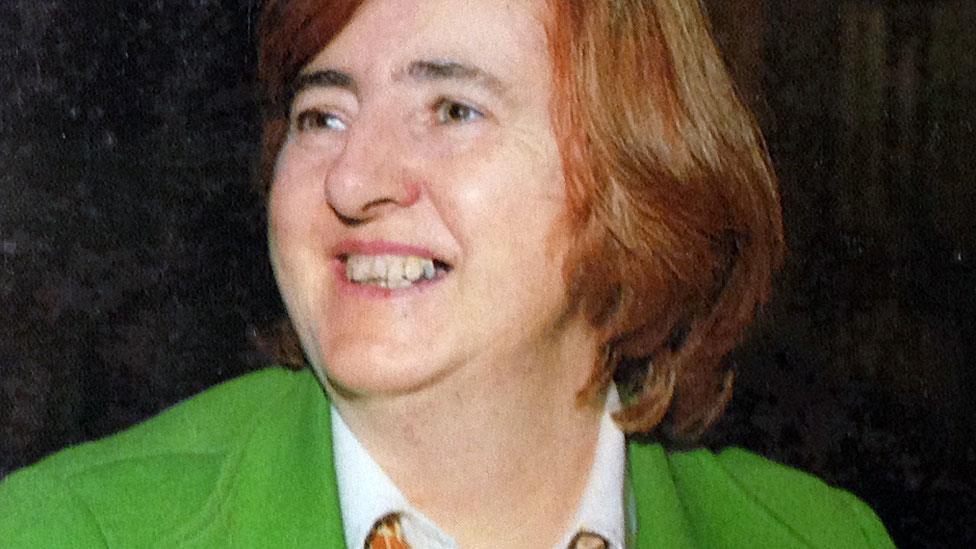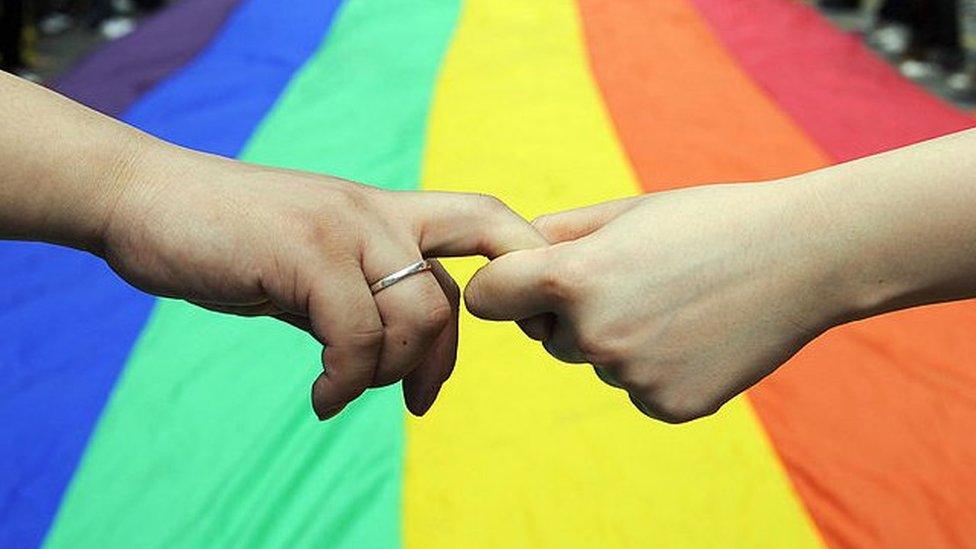Parliament takes pride in role in gay rights struggles
- Published

Flying the flag for LGBT rights - Parliament shows it solidarity
Westminster's "palace of enchantments" will be given an LGBTI gleam this weekend - lit up in the colours of the rainbow flag to mark both Pride Week and also the 50th anniversary of the Act of Parliament which legalised gay sex.
The decision was taken by Commons Speaker John Bercow and the Lord Speaker, Lord Fowler, who explained their thinking in their first-ever joint interview, for Radio 4's Today in Parliament.
Legalisation, in 1967, was the product of a ten-year parliamentary campaign to follow-up the 1957 Wolfenden Report which had recommended the decriminalisation of consenting male homosexual sex.
There had been gathering pressure and determined resistance as the issue surfaced repeatedly in Parliament, with furious internal argument within the two main parties.
My favourite moment was a question put by the Conservative former Lord Chancellor, Lord Kilmuir, who asked "are your Lordships going to pass a bill that would make it lawful for two senior officers of police to go to bed together?"
The Conservative MP Humphrey Berkeley brought in a bill for reform, but lost his seat in the 1966 general election. He was not reselected, and was told that his local party could tolerate him being for either homosexual law reform or the abolition of hanging, but not both.
The torch was passed to the Labour MP, Leo Abse, who won approval for a ten-minute rule bill in July 1966, by 244 votes to 100. Abse had the support of the new Home Secretary, Roy Jenkins, who battled in Cabinet to persuade reluctant colleagues to give government support to the Bill.
Opponents thought it was the product of middle class liberalism and would alienate Labour's working-class base, but the government did eventually crucial provide extra debating time in the Commons, when Abse's private members bill faced a filibuster.
The necessary 100 MPs needed to force votes at regular intervals in the debate was mustered, and at 5.50am on the morning of July 4, 1966, the Bill passed its Third Reading by 99 votes to 14, after a 20-hour sitting.

Labour MP Leo Abse's bill decriminalising gay sex was a landmark moment in post-war British history
Legalisation was presented in an apologetic way - a measure to end the criminalisation of unfortunates - and not a "vote of confidence in homosexuality".
The age of consent was set at 21, and despite attempts to lower it by, among others, the Conservative Edwina Currie, it remained at that age until 2000.
Even after legalisation, the personal consequences for MPs and others in the public eye of being outed were still devastating.
There were cases like that of Maureen Colquhoun, a Labour MP elected in Northampton in 1974, who brought in bills on abortion, gender balance and the protection of prostitutes.
Her relationship with another woman was revealed in the Daily Mail. She defeated two attempts to deselect her, and she was forced to campaign for re-election in 1979, with some party members refusing to support her because of her private life, rather than her politics. She lost.

Maureen Colquhoun saw off two attempts to deselect her
Perhaps the most high profile example was that of someone who never actually made it into Parliament, Peter Tatchell, the Labour candidate in the 1983 Bermondsey by-election, whose homosexuality became an election issue.
In an interview on Radio 4's Today in Parliament on Friday, Joanna Cherry, the gay SNP MP, said the level of "hate filled homophobia" he faced deterred her from any idea of a career in politics - although she would have liked (at that time) to be a Labour MP.
Labour's Chris Smith, a future Culture Secretary, was the first MP to come out as gay, in 1984.
And there was also legislation, like Section 28 of the 1988 Local Government Act, which said local councils could not "intentionally promote homosexuality or publish material with the intention of promoting homosexuality" or "promote the teaching in any maintained school of the acceptability of homosexuality as a pretended family relationship".
Westminster tribute: 50 years after gay sex decriminalisation
No prosecution was ever brought under Section 28, but it had considerable impact on, for example, lesbian, gay and bisexual support groups in schools and colleges. It was repealed in 2000.
In recent years the battles have tended to be on legislation designed to be anti-discriminatory, first the creation of Civil Partnerships, then the legislation to allow same-sex couples to marry, and most recently the "Turing Bill" to pardon gay men convicted for offences that would not be considered crimes today.
Today, Speaker Bercow's coat of arms features LGBT colours. And for Norman Fowler, the Lord Speaker, his experience as health secretary in the 1980s, when AIDS emerged as a major public health issue, it brought the issue for discrimination against gay people into focus.
Both wanted Parliament to pay its respects to the LGBT community and to show solidarity.
"We have gone in half a century from the criminalisation of one type of love to almost complete legal equality," Mr Bercow said.
Lord Fowler said the lighting of one of the most famous buildings in the world would be a symbol to people who were being persecuted.
- Published5 July 2017
